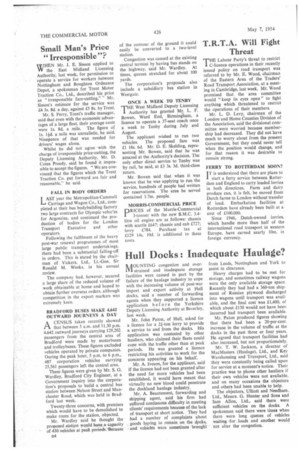Hull Docks : Inadequate Haulage?
Page 48

If you've noticed an error in this article please click here to report it so we can fix it.
NAOUNTING congestion and overIV1 strained and inadequate storage facilities were caused in part by the failure of the haulage industry to cope with the increasing volume of post-war import and export activity at Hull docks, said a number of forwarding agents when they supported a licence application be f o r e the Yorkshire Deputy Licensing Authority at Beverley, last week.
Mr. John Paton, of Hull, asked for a licence for a 21-ton lorry to provide a service to and from the docks. His application was contested by other hauliers, who claimed their fleets could cope with the traffic other than at peak periods. He was granted a licence restricting his activities to work for the concerns appearing on his behalf.
Mr. A. Iveson, for the applicant, said if the licence had not been granted after the need for more vehicles had been established, it would have meant that virtually no new blood could penetrate the dockland haulage industry.
Mr. A. Beautement, forwarding and shipping agent, said his firm had suffered continuous difficulty in meeting clients' requirements because of the lack of transport at short notice. They had had a number of complaints about goods haying to remain on the dpcks, and vehicles were sometimes 'brought from Leeds, Nottingham and York to assist in clearance.
Heavy charges had to be met for storage, and sometimes railway wagons were the only available storage space. Recently they had had a 360-ton shipment of Russian plywood discharged into wagons until transport was available, and the final cost was £1,400, of which about £150 would not have been incurred had transport been available.
Mr. Paton produced figures showing that there had been a 20-per-cent. increase in the volume of traffic at the docks in the past three or four years. He agreed that transport facilities had also increased, but not proportionately.
Mr. T. W. Jackson, a director of MacMasters (Haulage), Ltd., and Key Warehousing and Transport, Ltd., said they were constantly being called upon for service at a moment's notice. Their practice was to phone other hauliers if their own vehicles were not available, and on many occasions the objectors and others had been unable to help.
The objectors, Ulliott and Needham. Ltd., Messrs. G. Hunter and Sons and Sam Alton, Ltd., said there were sufficient vehicles on the docks. A spokesman said there were times when there were long queues of vehicles waiting for loads and another would not alter the congestion.








































































































